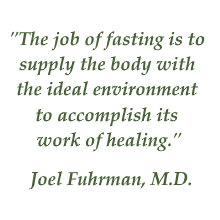Chronic Degenerative
Diseases and Fasting
One benefit of fasting is how it allows the body to heal itself in a manner that effects the whole organism, or holistically. It is a rebalancing that occurs on all levels of our being and allows the innate intelligence of the body to foster healing in its own appropriate way.
Fasting is considered an "alternative" therapy because it isn't prescribed by the mainstream of conventional Western medicine, which attempts to treat ailments and conditions most commonly with invasive techniques. While these modern techniques are highly successful in treating some conditions, they fail miserably in other conditions.
Andrew Weil, an M.D. and popular author on the subject of natural healing and holistic medicine, has spelled it out succinctly in his book Spontaneous Healing. His advice:
"Do not seek help from a conventional doctor for a condition that conventional medicine cannot treat, and do not rely on an alternative provider for a condition that conventional medicine can manage well."
How to know the difference? This is Weil's breakdown:
Conventional medicine CAN:
- "Manage trauma better than any other system of medicine.
- Diagnose and treat many medical and surgical emergencies.
- Treat acute bacterial infections with antibiotics.
- Treat some parasitic and fungal infections.
- Prevent many infectious diseases by immunization.
- Diagnose complex medical problems.
- Replace damaged hips and knees.
- Get good results with cosmetic and reconstructive surgery.
- Diagnose and correct hormonal deficiencies."
Conventional medicine CANNOT:
- "Treat viral infections.
- Cure most chronic degenerative diseases.
- Effectively manage most kinds of mental illness.
- Cure most forms of allergy or autoimmune disease.
- Effectively manage psychosomatic illnesses.
- Cure most forms of cancer."
Where fasting most shines as an alternative practice is with the degenerative diseases and chronic conditions that traditional medicine falters on. Degenerative diseases are conditions of deterioration progressing over time, and are generally caused by long-term lifestyle choices and/or bodily wear due to age.
This benefit of fasting page shows the type of conditions most commonly positively affected by fasting, the vast majority of which the traditional medical community fails to treat effectively.
Related Pages
Intermittent Fasting offers several unique
methods for integrating regular fasting into your life.Be aware of the Precautions to Fasting.
How long should you fast? Discover what length of time is best for you and how much preparation is required.
Fruit Fast Details how to do a 1-3 day fast with apples.
What is Fasting? Dispels any doubts about fasting being akin to starvation.
Recent Posts
-
Valter Longo and the Longevity Diet
Valter Longo's Longevity Diet, which is a fasting mimicking diet, is showing great promise as a prescribed therapy. If you haven't heard of Valter Longo, check out his newly launched website to follow… -
Fasting Overview for Beginners
Information on fasting especially geared toward the beginner. Important guidelines on fasting including the contraindications and how to do a simple one-day fast. -
Meat vs. Vegan | AllAboutFasting
Confusion seems to arise as to whether this site promotes meat-eating or veganism. Let's set the record straight and talk about ideal diets. Ideal for whom? Each of us individually.
